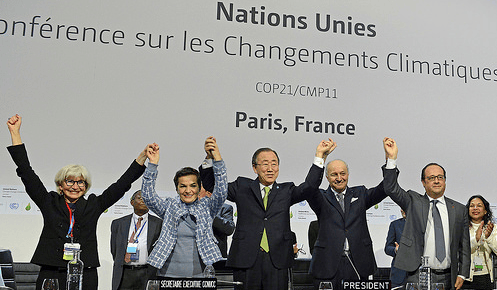
Based on knowledge provided by the international scientific community, the text calls science to play a leading role also in the future. Antonio Navarra comments on the COP21 final accord.
“The Paris Climate Agreement represents a very important step for climate change policies and scientific research. The content of the text is in fact based on knowledge provided by the international scientific community in the last years while underlining the future important role of research in order to provide tools and further information essential to achieve the target specified in the climate deal”. Antonio Navarra, President of the Euro-Mediterranean Center on Climate Change, comments on the final outcome of COP21, the UN climate change conference that came to the end on December 12th, 2015.
The text of the Paris agreement was approved by all participants while marking a historic turning point in the climate change negotiations.
The agreement indicates the long-term goal of holding the increase in the global average temperature to well below 2 °C above pre-industrial levels and to pursue efforts to limit the temperature increase to 1.5 °C above pre-industrial levels. The necessary pathways to reach the main goal are also pointed out. Among other things, the text talks about the mitigation strategies to curb greenhouse gas emissions, the role of forests as carbon sinks, a set of tools and a review mechanism to make the point of progress achieved.
Particular attention is paid to adaptation actions; developed countries recognize in particular the need to support developing countries for the adaptation to climate change. Adaptation will require efforts for the design, implementation and transfer of technologies able to cut emissions while raising and strengthening the resilience of all countries especially of the most vulnerable areas to the impacts of climate change.
“Regarding these issues, scientific research plays now and will also play in the future a very important role. The last IPCC assessment report released on October 2014 represents the most comprehensive assessment providing a clear and up to date view of the current state of scientific knowledge relevant to climate change, whereas the Paris agreement represents a further step ahead, and highlights the complexity of the issue. Climate change is deeply linked to many aspects of our social, economic and environmental systems, while it requires actions at international, national and local level. Addressing climate change in a compelling and effective way means playing a leading role in a challenge that, as the Paris climate deal states, will require – probably as never before – cutting-edge innovation, the most efficient technologies, the collaboration between different disciplines and the sharing of good practices, experiences and lessons learned “, Antonio Navarra says while remarking the Paris agreement.
“I think that the scientific community will accept that challenge while trying to do its best to find effective solutions and tools to address climate change”.


